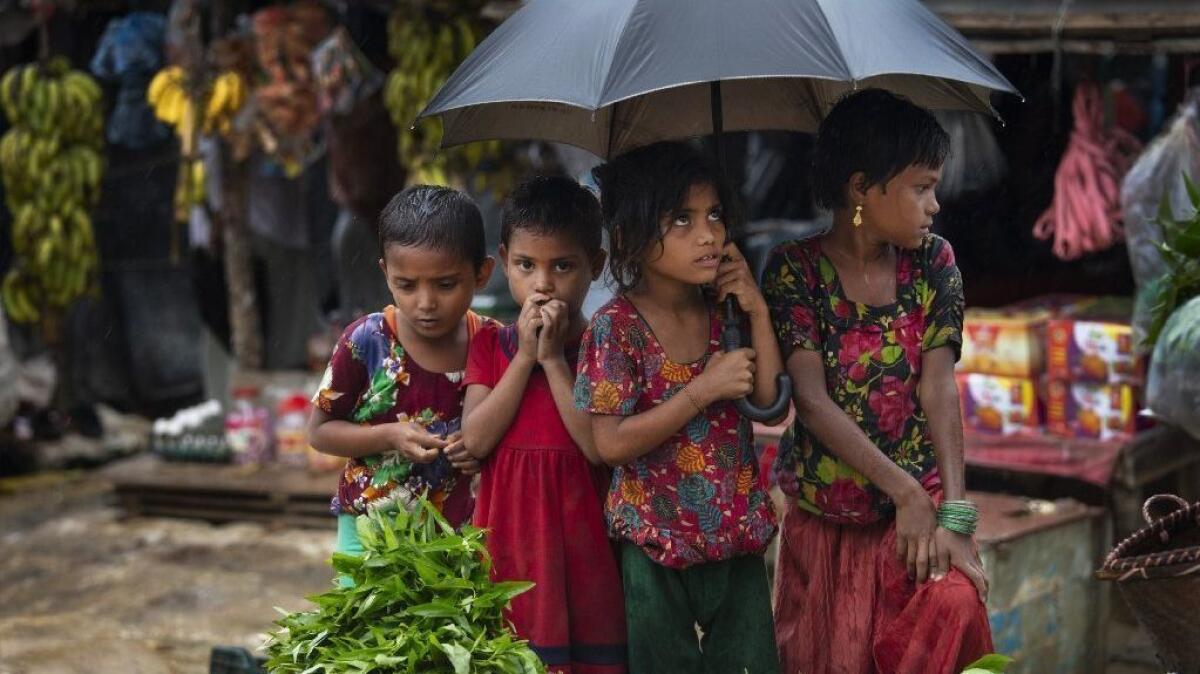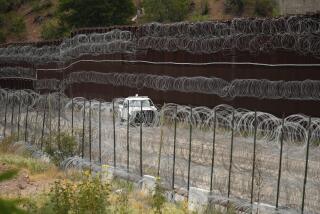Trump administration faces criticism for seeking sharp cut in refugees settled in the U.S.

Reporting from Washington — Facing backlash over the decision to drastically limit the number of refugees who will be permitted to settle in the United States, State Department officials are attempting to defend the move and soften its impact.
But ultimately, the proposed new quota — down a third from last year’s number and an all-time low — will likely remain the same or even smaller because it fits into President Trump’s broader policy, which critics say is aimed at reducing the number of foreign-born people in the United States.
For the record:
1:00 p.m. Sept. 20, 2018An earlier version of this story said the proposed refugee cap was a third of last year’s number. It is down a third, from 45,000 to 30,000 refugees.
Amid what the United Nations calls the worst refugee crisis since World War II, millions of people have fled war, famine or political repression in the Middle East, Africa and more recently, Central and South America.
Despite some polls that show general public support for refugees, Trump has been accused of trying to build political capital among his base by stoking fear of immigrants and apathy toward refugees.
Secretary of State Michael R. Pompeo announced late Monday the administration’s plan to slash the number of refugees accepted in the United States by a third, down to 30,000 from this year’s cap of 45,000 and the lowest since the Refugee Act was adopted nearly 40 years ago. It is the second consecutive year the ceiling has been lowered.
Pompeo said the lower goal was made necessary by the backlog of asylum seekers in the United States, numbering 800,000.
The cap reflects “our commitment to protect the most vulnerable around the world while prioritizing the safety and well-being of the American people, as President Trump has directed,” Pompeo said.
Barely 24 hours later, the decision was met with a scathing blast of criticism from members of Congress and immigrant-advocacy and human rights groups.
Refugee advocates described the proposed limit as appalling and an affront to front-line countries like Jordan, Lebanon and Turkey that have received millions of refugees.
“The abysmally-low refugee cap ... is a shameful abdication of our humanity in the face of the worst refugee crisis in history,” said Jennifer Quigley of the Human Rights First advocacy organization. “By setting the lowest refugee cap in history, we have turned our backs not only on those in dire circumstances abroad, but on our own American ideals.”
Ryan Mace, refugee specialist at the U.S. branch of Amnesty International, said the new ceiling, compounded by “roadblock after roadblock” for refugees, was an “all-out attack” on refugee resettlement.
Sen. Ben Cardin (D-Md.) was one of several lawmakers, mostly Democratic, who condemned Pompeo’s proposal as a cruel move that will only weaken the United States. He said it was part of Trump’s determination “to build metaphorical walls” around the country.
The State Department attempted to clarify that the new ceiling was merely a recommendation that would be reviewed by Congress before the White House would sign off.
The Trump administration wants to prevent immigration and floods of refugees by helping improve conditions in the home countries, State Department spokeswoman Heather Nauert said Tuesday. At the same time, however, the administration is reducing much of the aid that would fulfill that goal, such as reconstruction money for Syria and Iraq and democracy-building assistance in Central America.
“America is the most generous nation in the entire world,” Nauert said. But, she added, “Our pockets are not unlimited.”
Limiting refugees is just the latest in a string of anti-immigrant policies under the Trump administration, including a spike in the rejection of asylum applications; stepped-up raids on immigrant communities; increased deportations; separation of immigrant families who entered the country illegally; and ending a special temporary-protection status of thousands of people from war-torn countries or those suffering natural disasters, such as Haiti, Yemen and El Salvador.
From the early weeks of his government, Trump has made clear that his overall goal is to reduce legal and illegal immigration. His policies could eventually change the ethnic makeup of the United States.
Trump has said immigration should be based on “merit” and favor those who can easily “assimilate” or as he once put it, come “from places like Norway.”
Trump reiterated that sentiment on Tuesday during the visit of Polish President Andrzej Duda when asked by reporters about visa waivers for Poles.
“We love the people of Poland coming to the United States in any way, shape or form,” Trump said. In contrast, he has criticized immigration from poorer nations in Africa and Central America, calling them “shitholes.”
In the last year, refugees admitted to the United States are overwhelmingly Christian, about 70%, to about 14% Muslim, according to State Department figures, even though about 40% of the more than 60 million displaced people worldwide are Muslim.
Early in his administration, Trump sought to declare a ban on people arriving in the U.S. from several mostly Muslim countries. The ban, after numerous court stays, only survived after adjustments to assure courts that Muslims were not being targeted.
The new cap would apply in the next fiscal year starting Oct. 1. Only about 21,000 refugees have been permitted in during the fiscal year now ending, fewer than half of those allowed under the current ceiling of 45,000, according to State Department data.
Even in Europe, which has received the brunt of refugee flows from the Middle East that ultimately created significant political backlash, numerous countries have majorities that approve of receiving refugees, according to a report released Wednesday by the Pew Research Center.
Spain, Germany, Sweden, Britain and other countries that have seen immigration spur a right-wing nationalist surge nevertheless have three-quarters or more of their populations favoring refugee arrivals, the Pew study, conducted this summer, said.
For more on international affairs, follow @TracyKWilkinson on Twitter
More to Read
Sign up for Essential California
The most important California stories and recommendations in your inbox every morning.
You may occasionally receive promotional content from the Los Angeles Times.











